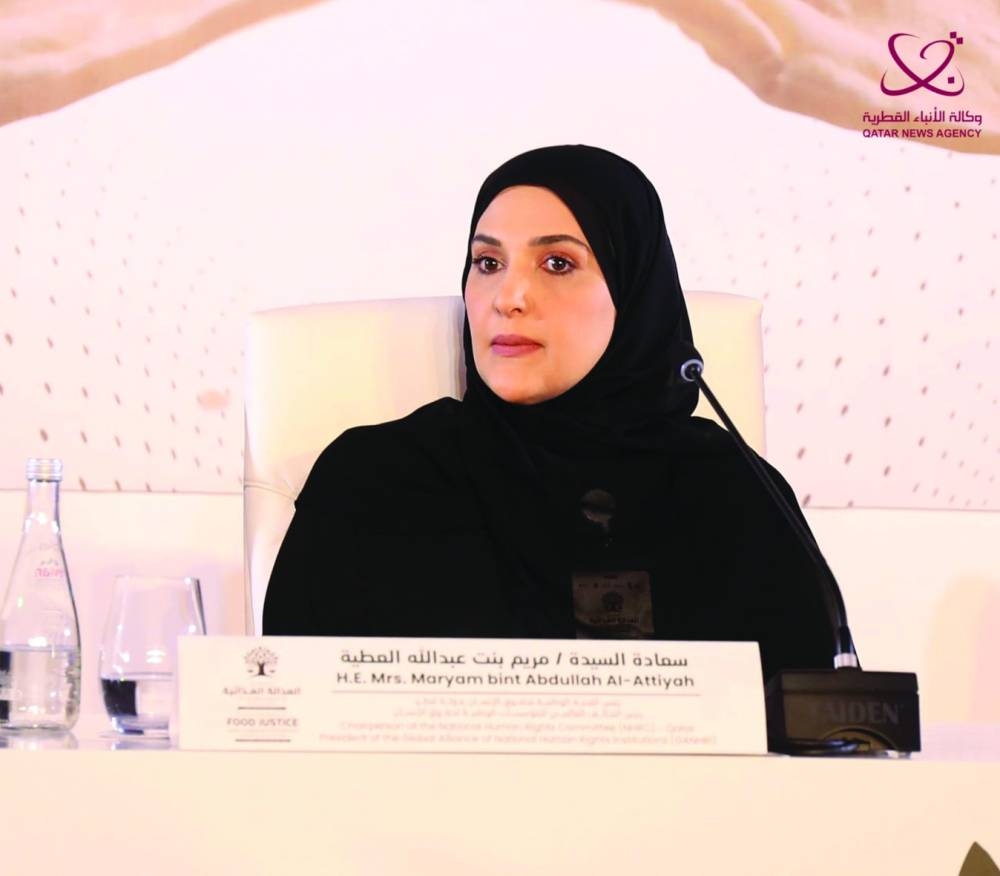Under the auspices of HE the Prime Minister and Minister of Foreign Affairs Sheikh Mohamed bin Abdulrahman bin Jassim al-Thani, the International Conference on Food Justice from a Human Rights Perspective kicked off Tuesday under the theme “Challenges of Reality and Future Stakes”.
The two-day conference, which is organised by the National Human Rights Committee (NHRC) in partnership with the Office of the UN High Commissioner for Human Rights, the Global Alliance of National Human Rights Institutions (GANHRI), the Office of the UN Development Program (UNDP), the International Fund for Agricultural Development (IFAD), and the Arab League, aims to provide a global dialogue platform for exchanging knowledge and experiences, building capacities and reviewing legislation, policies, plans, and programmes related to food justice from a human rights perspective, and developing frameworks and foundations from which those working in the field of food justice and human rights can proceed.
The opening was attended by HE the Speaker of the Shura Council Hassan bin Abdullah al-Ghanem, GCC Secretary-General Jasem Mohamed Albudaiwi, HE the Minister of Environment and Climate Change Dr Abdullah bin Abdulaziz bin Turki al-Subaie, HE the Minister of State for International Co-operation at the Ministry of Foreign Affairs Lolwah bint Rashid AlKhater, HE the Minister of State for Interior Affairs Sheikh Abdulaziz bin Faisal al-Thani, HE the Deputy Speaker of the Shura Council Dr Hamda bint Hassan al-Sulaiti, HE the Chairperson of the NHRC Maryam bint Abdullah al-Attiyah, and a number of senior officials.
Speaking during the opening of the conference, HE the NHRC chairperson stressed that joint action based on the human rights approach is capable of providing an effective response to addressing it.
She said that last year’s conference on climate change and its impact on human rights encouraged them to devote the current conference to discussing the global food crisis and achieving food justice, especially since this crisis is not the result of a lack of resources as much as it is a crisis of distribution and the pursuit of justice in an era characterised by scientific and technical progress and even capacity to harness resources to increase production and provide a decent life for humans.
She indicated that, however, the food crisis represents one of the most serious obstacles to a person’s actual enjoyment of his dignity and rights. She pointed out that food has become a cause of conflicts and wars, and there are many examples of this over the past few years.She said that as everyone knows, Qatar has spared no effort in assuming its international responsibility in addressing natural disasters and humanitarian crises, especially with regard to relief efforts and preventing the worsening of the food crisis.
She stressed that Qatar is one of the donor countries to the UN in the field of effective response to increasing humanitarian needs, pointing out that food justice will not be achieved in light of the continuation of wars and the denial of the right of peoples to self-determination, especially since justice is the title of peace and a condition for development, and the Palestinian people are still under the control of the settlement occupation and the brutal aggression against the Gaza Strip.
She noted that it is unfortunate that despite the scale of the crime that recently reached the corridors of the International Court of Justice, and the outbreak of popular demonstrations all over the world rejecting the continuation of the aggression, the international system and its institutions are still unable to deliver humanitarian relief and food aid to the Strip whose population is suffering from a collective famine in a difficult test of the credibility of human values enshrined in international law.
For his part, GCC secretary-general Albudaiwi said that numerous international law and international humanitarian law instruments recognise humans’ need for sufficient food, and despite that, a gap still remains in this regard around the world, mostly in developing countries that suffer from food shortages and hunger caused by natural disasters, the rising number of conflicts and wars, as well as weaponising food as means for applying pressure.
He added that a current case in point is what is happening in the Gaza Strip where the Israeli occupation forces are using food as a killing tool against the civilians in Gaza by depriving them of humanitarian aid and supplies of fuel, food, and medicines, which is prohibited under international humanitarian law.

NHRC Chairperson HE Maryam bint Abdullah al-Attiyah speaking at the opening of the conference.
